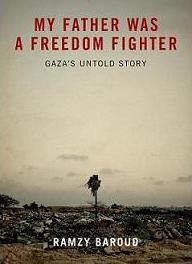Preview of Ramzy Baroud’s ‘My Father was a Freedom Fighter’

Ramzy Baroud is a veteran Palestinian-American journalist and former Al-Jazeera producer. He also taught Mass Communication at Australia’s Curtin University of Technology, is a frequent speaker, a regular media guest, and is the founder and Editor-in-Chief of the Palestine Chronicle, a leading resource for information on Israel/Palestine and much more.
He’s also written numerous articles, commentaries, short stories, and authored several books, including “The Second Palestinian Intifada: A Chronicle of a People’s Struggle,” and his latest and topic of this introductory review, “My Father was a Freedom Fighter: Gaza’s Untold Story.”
Baroud knows his subject well, having been born and raised in a Gaza refugee camp where he saw Israeli soldiers regularly oppress, harass, humiliate, and attack young Palestinians like himself in an attempt to crush their spirit and break their will to resist, to no avail no matter how hard they tried.
What follows is a snapshot of Baroud’s forthcoming book titled, “My Father was a Freedom Fighter: Gaza’s Untold Story.” As distinguished Palestinian author, historian, activist and founder and president of the London-based Palestine Land Society, Salman Abu Sitta, explained in the forward:
Ramzy is Mohammed Baroud’s son, a heroic “freedom fighter, (and himself) a gifted writer (who) eloquently unearthed the recent history of Beit Daras” village, chronicled his family’s struggle in exile, and recounted their determination to survive and endure under siege and assaults that continue to this day.
Many books covered the early years, but most were in Arabic. Baroud’s is one of the few in English “about the life, depopulation and (literal) struggle for survival of the people of a Palestinian village in southern Palestine.” In spanning over seven decades of history and survivor recollections, “it stands out as an unblemished depiction of their plight” as only those who experienced it can describe.
As a freedom fighter’s son, Baroud’s book is proof of a people’s persistence to survive, endure, and ultimately prevail in their historic quest for liberation, because of heroic men like father and son Baroud who’ll accept no less. Nor should anyone wanting everyone to be free, especially the long-suffering Palestinians and oppressed peoples everywhere.
Born in Beit Daras, Mohammed Baroud’s beloved village was conquered, leveled, and erased, except from the memory he took to his grave. One of seven children, he was born during the 1938 turmoil that erupted a decade later in merciless war that destroyed Beit Daras, 530 other villages, 11 urban neighborhoods in cities like Tel-Aviv, Haifa and Jerusalem, and slaughtered or displaced about 800,000 Palestinians with tactics reminiscent of Nazi WW II ruthlessness.
Mohammed and his family survived, were exiled to the Gaza Nuseirat refugee camp, dreamed always of going home, as a young man joined the Palestinian unit of the Egyptian army, later fought heroically for the Palestine Liberation Army (PLA) in the Six Day War, was wounded, and was horrified that historic Palestine was gone, its people captives on their own land, forced to endure Israeli occupation viciousness, that, for Gazans, is in the world’s largest open-air prison.
Throughout his life, he endured decades of struggle, conflict, violence, occupation, oppression, what Edward Said called “a slow death,” shattered hopes, and the incalculable horror of it all. It took its toll. Yet he raised six children, used his resources to educate them, believed occupation and poverty killed his young son Anwar, and then his wife Zarefah at age 42.
In his early 50s, he grew frail, needed two canes to walk, was weakened by various ailments by the late 1980s, and became increasingly disillusioned and impoverished.
Ill, in pain, and incapacitated, he was dying. The end came on March 18, 2008. Thousands turned out for his funeral, oppressed people like himself who shared his vision, struggles, and plight. “The resilient (freedom) fighter had finished the battle for a well-deserved moment of peace” while those left behind continue his courageous struggle, his son Ramzy one of them through his heroic work the way many others are equally committed and will be until Palestine is again free.
The book is available for pre-orders at Amazon.com
Stephen Lendman is a Research Associate of the Centre for Research on Globalization. He lives in Chicago. Contact him at: [email protected].

